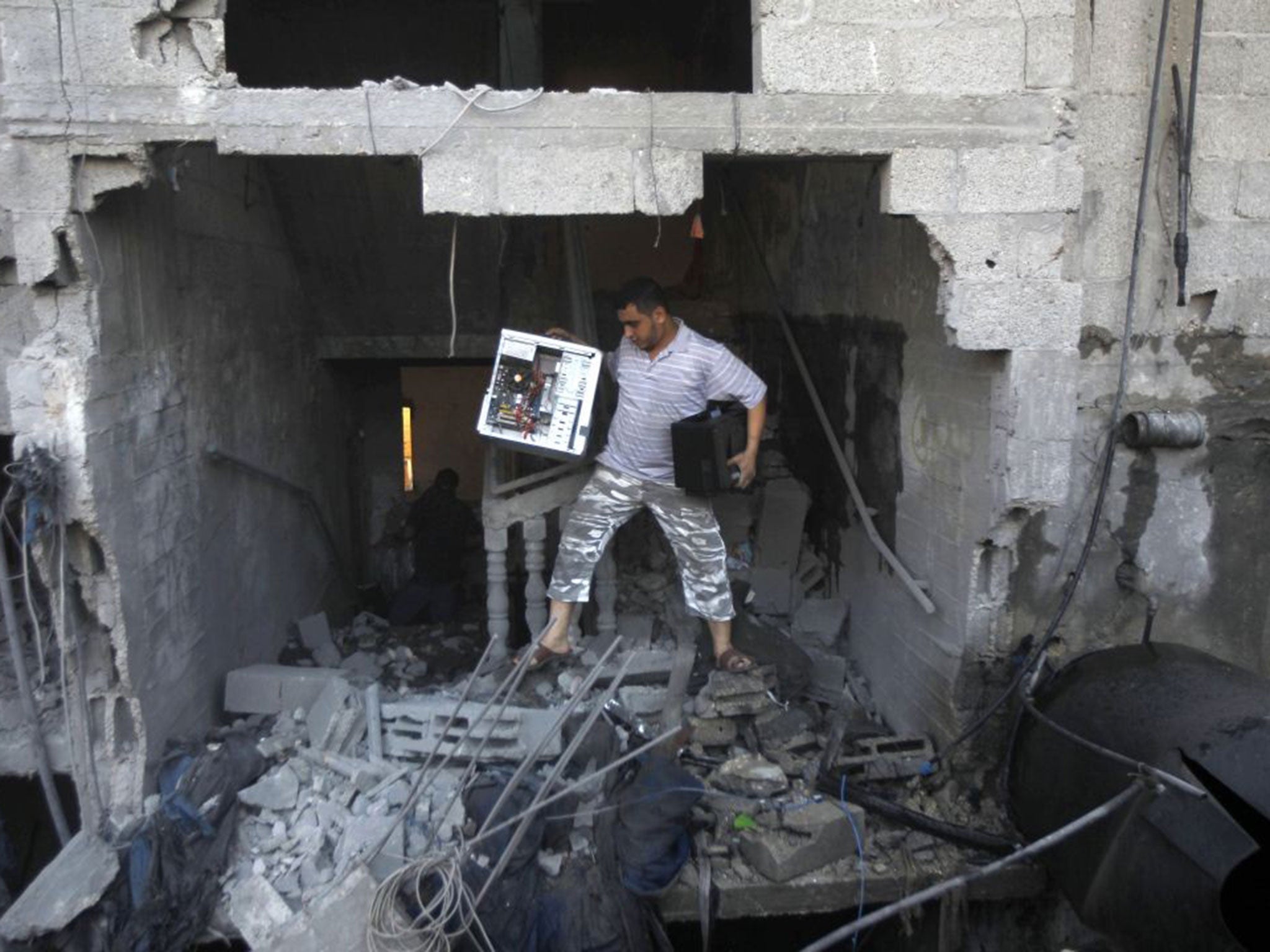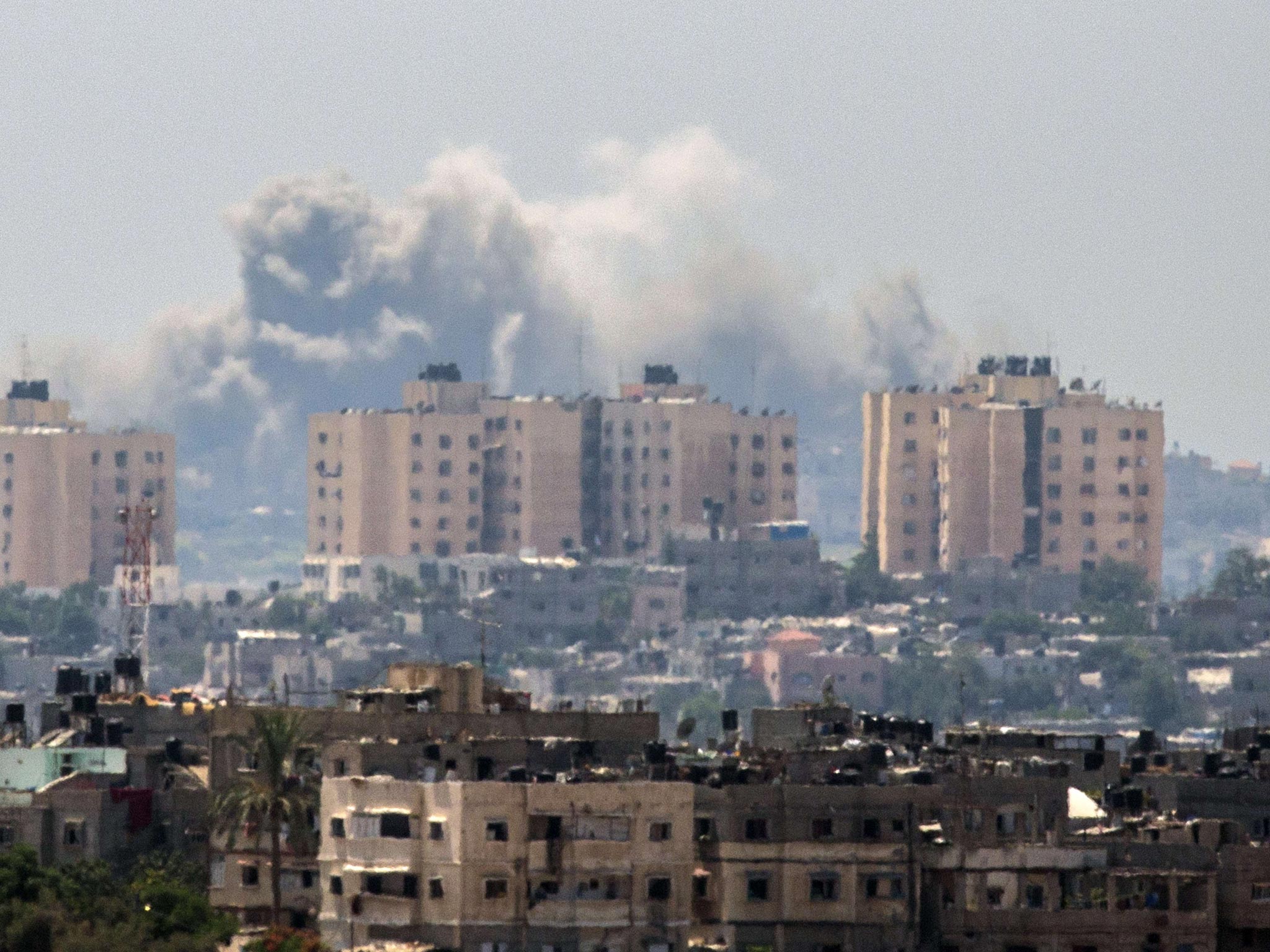Israel-Palestinian crisis: Gaza death toll rises as Israeli forces continue air and sea assault
Palestinian President Mahmoud Abbas believes ground invasion is imminent

Your support helps us to tell the story
From reproductive rights to climate change to Big Tech, The Independent is on the ground when the story is developing. Whether it's investigating the financials of Elon Musk's pro-Trump PAC or producing our latest documentary, 'The A Word', which shines a light on the American women fighting for reproductive rights, we know how important it is to parse out the facts from the messaging.
At such a critical moment in US history, we need reporters on the ground. Your donation allows us to keep sending journalists to speak to both sides of the story.
The Independent is trusted by Americans across the entire political spectrum. And unlike many other quality news outlets, we choose not to lock Americans out of our reporting and analysis with paywalls. We believe quality journalism should be available to everyone, paid for by those who can afford it.
Your support makes all the difference.The death toll in Gaza has risen to at least 79 as Israel continues its offensive in the strip and rocket fire from Palestinian militants shows no sign of slowing.
Rockets were exploded above Tel Aviv by the Iron Dome defence system and missiles also reached Jerusalem and other cities in Israel. The government claims its response is needed to protect civilians.
So far, strikes have come from the air, sea and across the Israeli border but the Palestinian President, Mahmoud Abbas, said he believes Israel is only hours away from launching a ground invasion on Gaza on Friday.
Speaking at a meeting in Ramallah, the official Palestinian news agency quoted him saying the Israeli Government had already approved a land operation and its start was imminent.
Israeli leaders have hinted at a possible invasion by ground forces and some 20,000 army reservists have been mobilised, although no action has been confirmed.
The last time ground troops crossed into the Strip, one of the world’s most densely populated territories, was in 2009, and the last major exchange of rockets and missiles was in October 2012.

The armed wing of Hamas has warned airlines it intends to target Israel's Ben Gurion International Airport, in Tel Aviv, and has told them not to fly there on Friday.
A statement from the Islamist group said the attack would be in response to "Israeli aggression" in the Gaza Strip and said the airport was targeted because it hosts a military air base.
Medical officials in Gaza said four people were killed in pre-dawn attacks on Friday, including a man described as a doctor and pharmacist in a house hit by an air strike in Gaza City.
Medics and residents said an Israeli aircraft bombed a three-storey house in the southern town of Rafah.
Reports of casualties varied, with some saying three people were killed, while others claimed there were five fatalities, including a woman and seven-year-old child, and 15 other people were wounded.
While Israeli tanks reportedly fired shells east of Rafah, naval forces sent bombs into a security compound in Gaza City and aircraft bombed positions near the borders with Egypt and Israel.
The Israeli military confirmed fresh naval and air strikes were launched early but gave no further details.
According to medical officials, at least 60 civilians, including a four-year-old girl and a boy of five killed on Thursday, are among the 79 Palestinians who have died since Operation Protective Edge began on Tuesday.
Other victims include a Palestinian family of eight and football fans watching the World Cup at a beach café.
No fatalities have been reported in Israel, where the Iron Dome missile defence system intercepts incoming rockets and destroys them before they reach the ground.
Some have got through, including a rocket that hit a petrol station in the city of Ashdod on Friday, seriously wounding at least three people.
Rockets were also fired into northern Israel on Friday from Lebanon, but the country’s security officials said they did not know who was behind the attack, which Israel responded to with artillery fire.
Friday is the fourth day of Israel’s offensive in Gaza, which officials said was in response to escalating rocket attacks by Hamas. It came after three kidnapped Israeli teenagers were found murdered.
A 16-year-old Palestinian teenager, Mohammed Abu Khdeir, was burned alive in a suspected revenge attack by Jewish youths and protests and riots spread across East Jerusalem and Arab villages.
Benjamin Netanyahu, the Israeli Prime Minister, vowed there would be no ceasefire, despite the mounting death toll.
“I am not speaking with anyone about a ceasefire. That is not under consideration,” he said.
On Thursday, he called the escalating conflict a “battle progressing as planned” and said air strikes had “hit Hamas and the terror organisations hard”.
Barack Obama had called Mr Netanyahu with an offer to help broker a ceasefire and the French President, Francois Hollande, also called for a truce while voicing concern at civilian deaths.
Ban Ki-moon, Secretary-General of the United Nations, told an emergency meeting of the UN Security Council that Gaza “cannot afford another full-blown war” and the conflict could have a “combustible” effect in the West Bank.
Condemning Hamas and Islamic Jihad for firing more than 550 rockets and mortars into Israel, he also seemed to criticise Israel, saying that “the excessive use of force and endangering of civilian lives are also intolerable”.
A truce was brokered by Egypt in the 2012 conflict but the current military government is hostile towards Hamas, making mediation difficult.
A spokesman for the militant organisation, Sami Abu Zuhri, said: “Our backs are to the wall and we have nothing to lose. We are ready to battle until the end.”
Israeli authorities say more than 860 targets have been struck in Gaza, including militant commanders' homes, but residents said some of the destroyed houses did not belong to fighters.
Some people in targeted buildings received warning phone calls to get out and “knock-on-the-door” missiles, which do not carry explosive warheads, were fired in places as a signal to evacuate.
Join our commenting forum
Join thought-provoking conversations, follow other Independent readers and see their replies
Comments